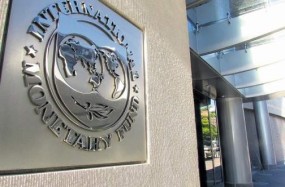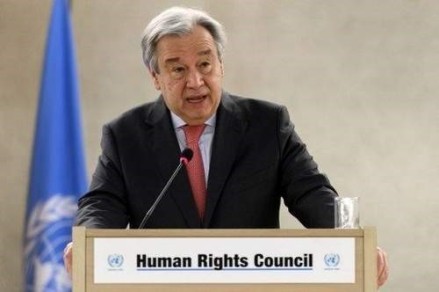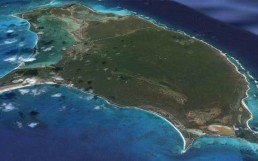Founder of Cool Corporation Joe Issa has said that the prime minister’s focus on implementing reforms in earnest is timely and consistent with poverty reduction strategies.
The former LSE student said the timeliness of the reforms, which are needed, provides the level of readiness for Jamaica to take advantage of the opportunities offered by the current upswing in the economies of its major trading partners.
Citing the well known phrase “when America sneezes Jamaica catches a cold” Issa argues  conversely, stating if the economies of its major trading partners are doing well so will it and that the growth of the Jamaican economy will enable poverty reduction, citing the latest growth forecasts for the developed world.
conversely, stating if the economies of its major trading partners are doing well so will it and that the growth of the Jamaican economy will enable poverty reduction, citing the latest growth forecasts for the developed world.
The latest International Monetary Fund (IMF) outlook for the global economy, which came in time for its annual meetings with the World Bank – a big founder of poverty alleviation projects and programmes – is optimistic.
It said “an upswing in the world economy would likely gather pace into next year, while calling on governments to strike while the iron is hot, as dangers for the current recovery are lurking on the horizon and ambitious reforms are necessary for continued reduction of poverty,” according to a US AFP report.
Referred to as the global crisis lender, the IMF projected global economic output to increase by 3.6 per cent this year and 3.7 per cent in 2018, a marginal increase from forecasts published three months ago but much higher than the growth experienced in 2016.
forecasts published three months ago but much higher than the growth experienced in 2016.
“The picture is very different from early last year, when the world economy faced faltering growth and financial market turbulence,” IMF Research Director Maurice Obstfeld reportedly said in prepared remarks.
But according to Obstfeld, the current moment presents a transitory opportunity to act, citing recent IMF warnings about sluggish growth in advanced economies, sharpening the divide between rich and poor and swelling sovereign debt levels.
But Issa argues further that given Jamaica’s already positive growth trajectory and its readiness to act upon impending opportunities, it will not be the one out of every five countries projected to return negative economic growth, which is an impediment to alleviating poverty.
In the latest version of its World Economic Outlook, the IMF now predicts advanced economies will grow by 2.2 per cent this year – 0.2 percentage points faster than a July estimate – before slowing to two percent growth next year, the report said.
In particular, it said Britain, Jamaica’s long-time trading partner with a weakening pound shrinking household incomes, as well as the uncertainty surrounding its future relations with Europe could see a drag on its growth.
And in the US, Jamaica’s biggest trading ally, it said “economic activity is strengthening, with the 2017 forecast moving up a tenth of a percentage point since July’s estimate to 2.2 per cent, slowing to two per cent next year.”
Another emerging trading partner, China, is expected to maintain high levels of public investment and pro-growth policies, with growth due to rise by 6.8 per cent this year and 6.5 per cent the next, as the country aims to meet their stated goal of doubling real GDP growth between 2010 and 2020.
But economic shocks and slow-burning dangers from different directions could make all of this short-lived, according to the IMF.
“Faster-than-expected interest rate hikes in the United States or Europe, commercial credit troubles in China, persistently low inflation in the developed world, a whole-sale rollback of post-crisis financial industry rules, a sudden shift toward protectionism and geopolitical tensions could all weigh on growth – making reforms much harder,” the report concluded.
Latest News
UN Secretary General makes case for concessionary loans for the Caribbean
Tuesday, October 10, 2017

António Guterres
ST JOHN’S, Antigua (CMC) — United Nations Secretary General António Guterres has made a case for special consideration to be made for mid to high income vulnerable states that have been “deprived” of concessional loans.
Guterras, who paid a visit to hurricane battered countries in the Caribbean over the weekend, said most of those impacted are middle income countries.
Antigua and Barbuda and Dominica were among Caribbean countries hit by Hurricanes Irma and Maria when they passed through the Lesser Antilles last month.
The two Caribbean Community (CARICOM) countries, due to their high per capital incomes, have advanced or “graduated” from the low income Least Developed Country (LDC) designation to Upper Middle Income.
The Category 5 storms severely damaged both countries, leaving trails of death and destruction estimated at billions of dollars.
“Most of the countries impacted are middle-income countries and because of that, they are deprived of the form of assistance or concessional loans that low-income countries can have access to,” said Guterres said after touring the two hurricane-battered countries.
“The fact is that even though these countries have graduated as middle-income countries, they have a number of vulnerabilities that need to be taken into account if we want them to be sustainable as middle-income countries,” he added.
Sponsored Links
The 10 Richest Mega-PastorsPressRoomVIP
13 Stunning Women Of The World’s Richest MenHooch
His comments came two weeks after Antigua & Barbuda Prime Minister Gaston Browne argued before the UN General Assembly (UNGA) that it was unfair for small, vulnerable states to be denied access to concessionary rates because of their per capital income.
Browne, a former banker, told the UN there was no justice in large, wealthy countries borrowing at a favourable three per cent per annum while “so called ‘high income’ small island states are forced to borrow commercially at 12 per cent per annum, to repeatedly rebuild.
He reiterated his position during a joint news conference with Guterres over the weekend, calling for the per capita income criteria to be reconsidered.
“I want to make the call again for the issue of per capita income, that nonsensical criterion, to be scrapped. It is an impediment to the growth and development of small island states.”
Guterres, who was once the UN’s High Commissioner for Refugees, called for “innovative forms of funding” for countries that are facing external shocks like that experienced in Antigua and Barbuda and Dominica.
“When these countries are facing external shocks of the magnitude that we are witnessing, it is absolutely crucial that they benefit from innovative forms of funding, and from assistance, concessional loans, new bonds,” Guterres said.
The UN Chief pledged to do everything possible to ensure that the international community fully assumes its responsibilities in support of the islands impacted by such dramatic events. He also said that the United Nations Economic Commission for Latin America and the Caribbean (ECLAC) is exploring the possibility of transforming the repayment of debt in investments made by the countries in resilience to storms. Affected countries would also be able to benefit from an upcoming donor’s conference.
“There (are) a number of instruments that can be put in place. The World Bank will be launching soon a donors’ conference. I would recall that the World Bank had the initiative several years ago to consider that countries like Jordan and Lebanon, because of the inflow of refugees, even if they were middle-income countries, should have access to concessional financing, because of the external shock that these refugees represented.”
Concerned about the impact of climate change on small vulnerable states, Guterres made a strong appeal for international solidarity with the Caribbean islands impacted by the storms. Not only should such solidarity translate to humanitarian aid, but into new mechanisms that would allow for effective reconstruction to build up resilience to future storms.
“I think we are now facing a similar situation and my appeal to the international community to have an engagement in developing mechanisms of financing allowing the Caribbean states to be able not only to face the enormous challenges they are facing, but to fully commit themselves to the Sustainable Development Goals and to the well-being of their population,” Guterres said.

 Issa was commenting on a survey of over 18,000 British motorists which shows that a fifth of them were concerned that their car will lose value ahead of the government’s proposed ban on the sale of new petrol and diesel cars by 2040.
Issa was commenting on a survey of over 18,000 British motorists which shows that a fifth of them were concerned that their car will lose value ahead of the government’s proposed ban on the sale of new petrol and diesel cars by 2040. conversely, stating if the economies of its major trading partners are doing well so will it and that the growth of the Jamaican economy will enable poverty reduction, citing the latest growth forecasts for the developed world.
conversely, stating if the economies of its major trading partners are doing well so will it and that the growth of the Jamaican economy will enable poverty reduction, citing the latest growth forecasts for the developed world. forecasts published three months ago but much higher than the growth experienced in 2016.
forecasts published three months ago but much higher than the growth experienced in 2016.

 Many islands are now left counting the costs of lives and property, and it’s not even over yet.
Many islands are now left counting the costs of lives and property, and it’s not even over yet.

 One of Jamaica’s largest distributors of petroleum products, Joe Issa, once advocated that “in order to stay connected with tomorrow’s children, we need to create a better world for them today, than we were welcomed into yesterday,” stating that “the best way to visualize it, is to fast forward and then rewind.”
One of Jamaica’s largest distributors of petroleum products, Joe Issa, once advocated that “in order to stay connected with tomorrow’s children, we need to create a better world for them today, than we were welcomed into yesterday,” stating that “the best way to visualize it, is to fast forward and then rewind.”
